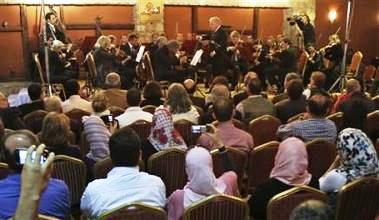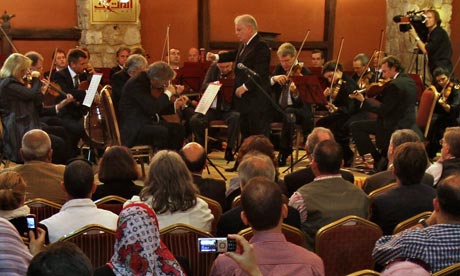Accueil > MAGHREB-MACHREQ EN MOUVEMENT > BARENBOÏM ET UN ORCHESTRE EUROPÉEN ENCHANTENT GAZA
BARENBOÏM ET UN ORCHESTRE EUROPÉEN ENCHANTENT GAZA
mercredi 4 mai 2011
“BARENBOÏM ET UN ORCHESTRE EUROPÉEN ENCHANTENT GAZA”, Al-Oufok, le 4 mai 2011
“DANIEL BARENBOIM BRINGS SOLACE AND PLEASURE’ TO GAZA WITH MOZART CONCERT”, Guardian, 3 mai 2011
BARENBOÏM ET UN ORCHESTRE EUROPÉEN ENCHANTENT GAZA

Le chef d’orchestre israélo-argentin Daniel Barenboïm a pour la première fois dirigé mardi un "concert pour la paix" dans la bande de Gaza, à la tête d’un ensemble européen, qui a enchanté plus de 300 mélomanes, dont beaucoup de jeunes.
Barenboïm, 68 ans, un militant pour la paix entre Israéliens et Palestiniens, était à la tête d’un ensemble spécialement formé pour l’occasion, "L’ORCHESTRE POUR GAZA". Une formation composée de 25 musiciens de prestigieux orchestres européens (Staatskapelle et Philharmonique de Berlin, Philharmonique de Vienne, Orchestre de Paris et Scala de Milan).
"C’est un geste unique de l’Europe toute entière pour vous, à Gaza", a expliqué le maestro, sous un tonnerre d’applaudissements.
"Vous êtes bloqués ici depuis des années. C’est la raison pour laquelle nous sommes venus aujourd’hui. Pas seulement pour vous donner du réconfort et, peut-être, du plaisir d’écoute, mais aussi pour que vous compreniez que beaucoup de gens dans le monde s’intéressent à vous", a-t-il dit.
C’est la première fois qu’un orchestre d’un tel niveau se produisait dans ce territoire palestinien déshérité, sous blocus israélien depuis 2006.
Daniel Barenboïm et ses musiciens se sont rendus mardi dans la bande de Gaza en passant par l’Egypte via le poste frontière de Rafah.
"C’est sûrement le concert le plus historique auquel il m’a jamais été donné de jouer", a confié Dieter Flury, un flûtiste du Philharmonique de Vienne.
Dans la délégation, figurait l’ex-patron de la chaîne franco-allemande Arte, Jérôme Clément, qui a trouvé "très important le fait de transmettre ce message de paix, d’amitié et d’humanisme via la musique".
Ce "concert pour la paix" et "apolitique", organisé par des ONG palestiniennes en coopération avec l’ONU, s’est déroulé au centre culturel al-Mathaf, au nord de la ville de Gaza.
Il s’est ouvert avec les notes de la "Petite musique de nuit", suivie de la Symphonie N°40 en sol mineur du même Mozart —qui a servi de mélodie à l’une des plus fameuses chansons de la Libanaise Fairouz, idole des Palestiniens notamment.
"Mes élèves vont aimer. Cela peut changer quelque chose dans leur esprit et leur donner une chance de réfléchir avant de juger les gens", a expliqué Fatima Chahine, 28 ans, une professeur d’anglais qui accompagnait un groupe d’adolescentes du camp de réfugiés de Jabaliya, faisant allusion à la nationalité israélienne de Daniel Barenboïm.
"Cela fera vraiment une différence parce qu’il apporte un message de paix", a ajouté l’enseignante.
Pianiste et chef d’orchestre israélien et argentin, également espagnol et porteur d’un passeport palestinien, M. Barenboïm a créé en 1999, avec son ami Edward Saïd, intellectuel palestinien décédé en 2003, un célèbre orchestre de jeunes arabes et israéliens de 14 à 25 ans, L’ORCHESTRE DIVAN, qui se produit dans le monde entier.
"Mon mari aurait été enchanté. J’espère que les gens apprécient et comprennent le sens de cette visite (de Daniel Barenboïm)", a déclaré à l’AFP Mariam, l’épouse d’Edward Said.
Né à Buenos Aires en 1942 de parents juifs d’origine russe, Daniel Barenboïm utilise depuis longtemps sa renommée internationale pour promouvoir la cause de la paix entre Israël et ses voisins.
"Je suis un Palestinien. Je suis aussi un Israélien. Vous voyez donc qu’il est possible d’être les deux", a expliqué passionnément le maestro au public.
Il apparaît régulièrement en Cisjordanie, mais il s’est vu refuser à plusieurs reprises par les autorités israéliennes la permission de se rendre à Gaza en transitant par le territoire israélien.
Les ressortissants civils israéliens sont interdits d’entrer dans les Territoires palestiniens, selon la loi israélienne.
(Mercredi, 04 mai 2011 - Avec les agences de presse)
Sources : Al-Oufok - (Rédaction)
retour en haut de page
DANIEL BARENBOIM BRINGS
’SOLACE AND PLEASURE’ TO GAZA
WITH MOZART CONCERT
Israeli conductor voices support for non-violence and Palestinian state during performance for schoolchildren and NGO workers

Daniel Barenboim conducts the Orchestra for Gaza in Gaza City.
Photograph : Adel Hana/EPA
The orchestra arrived with the impact of a presidential motorcade, in armoured cars, with sirens wailing and flanked by dozens of armed men.
It was an unusual overture to a rendition of Mozart. But then, the arrival in Gaza of Daniel Barenboim, the world-famous Israeli conductor and his Orchestra for Gaza – featuring musicians from Paris, Milan, Berlin and Vienna - to play for an audience of schoolchildren and NGO workers was itself far from usual.
The orchestra set off from Berlin on Monday, stopped at Vienna and then landed at El Arish, close to the Egyptian side of the Gaza Strip, on a plane chartered by Barenboim himself.
As an Israeli citizen it is illegal for Barenboim to enter Gaza without a permit, and, as if that wasn’t enough, the recent murder of an Italian peace activist and fears that pro-Osama bin Laden groups in Gaza might seek revenge on western targets meant that the UN security team was on high alert.
Barenboim has previously played in Ramallah and holds an honorary Palestinian passport, and is widely praised for his attempts to reach out across the divide. In Israel, meanwhile, he has been attacked for promoting the work of Wagner.
He told his audience on Tuesday that the people of Gaza "have been blockaded for many years and this blockade has affected all of your lives."
The aim of his orchestra, he said, was to bring "solace and pleasure" through music to the people of Gaza and to let them know that people all over the world care for them.
Gaza is more accustomed to the sound of explosions, sonic booms and the traditional drums and pipes that accompany its nightly weddings than Mozart. Many religious leaders disapprove of music, and people in general prefer Middle Eastern-style music to Western classical or popular music.
Barenboim drew a burst of applause and then a murmur of appreciation as the orchestra began when he told the audience that they might recognise the first movement of Mozart’s Symphony No 40 as it was the basis of one of the celebrated songs of Fairuz, the most famous living singer in the Arab world.
The orchestra first played Mozart’s Eine Kleine Nachtmusik, which was warmly appreciated, but Barenboim’s speech at the end of the performance went down even better.
"I am a Palestinian ..… and an Israeli," he told the audience, who applauded the second statement only slightly less than the first. "So you see it is possible to be both."
He said the Israeli and Palestinian conflict was one between two peoples who believe they are entitled to live on a single piece of land rather than a conflict between two nations about borders, adding that the whole world understood that a Palestinian state should be established on the land that Israel occupied in 1967.
"Everyone has to understand that the Palestinian cause is a just cause therefore it can be only given justice if it is achieved without violence. Violence can only weaken the righteousness of the Palestinian cause," he said.
Referring to the revolutions in the Arab world and the nuclear catastrophe in Japan, he said that everyone should question their past actions. "Every musician here has played these pieces many times, sometimes hundreds of times. Yesterday we looked at this music as if we had seen it for the first time. We never accept that the next note will played the same way it was played before. Thinking anew is our daily activity. I hope all the people of this region can take note of that," he said.
Diana Rustum, 12, a pupil at a local UN school said she enjoyed the discipline of the musicians and the melody of the music. "I think it was different from Fairuz but just as beautiful," she said.
Abdul Rahman Abu Hashem, 12, insisted that he did not get bored during the hour-long performance. "It was very good," he said.
Source : Guardian du 3 mai 2011...
retour en haut de page
Voir en ligne : http://www.aloufok.net/spip.php?art...
en document joint socialgerie rappelle un ancien article du Monde Diplomatique (octobre 2001) de Edward Said.
